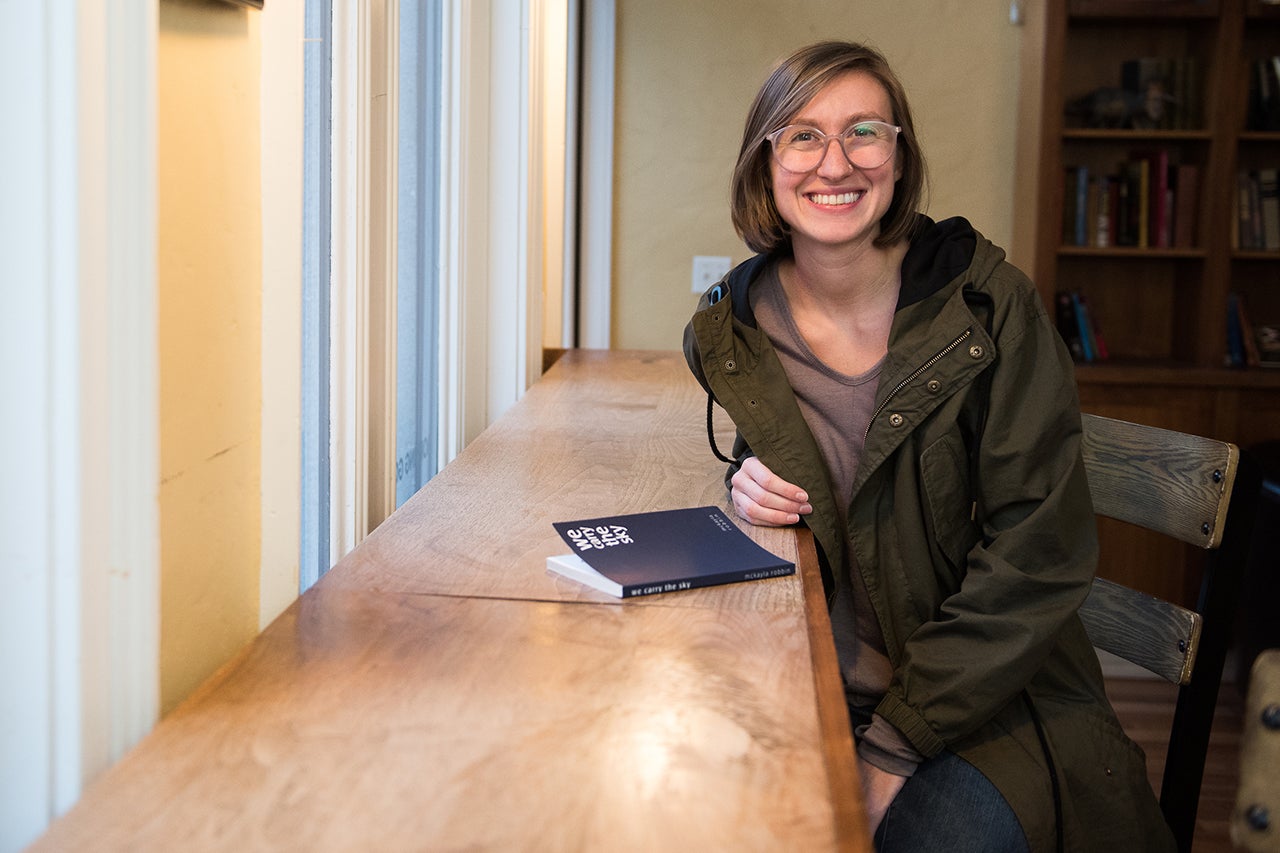If you want to be heard, you have to have a voice. If you want people to listen, you have to have something to say. But if you want to make real change, you have to have a conversation.
And, when McKayla Robbin released her book of poetry in late 2016 celebrating the strength of women in America, she gave a powerful voice and an empowering message to a conversation that – as chance would have it – was just getting started in our nation.
“I had no idea the subject of the book would be so relevant to the conversation right now, in this climate,” says the CofC Master of Fine Arts candidate whose first poetry collection, we carry the sky, was published just as women in America were bringing sexual harassment to the forefront of the national dialogue last year.
Thanks in part to the timing of the book’s release, Robbin’s poetry gained attention among writers’ groups on Instagram and was featured last April as one of Bustle’s “9 Feminist Poetry Collections to Read for National Poetry Month.”
“I’m so grateful that my poetry has been able to join the conversation surrounding women’s rights,” says Robbin, a regular contributor to Of the Wolves. “To be part of this conversation is an honor, and it inspires me as an artist.”
It inspired Elizabeth Masucci, too. The actor/producer/director was on a flight to Charleston when she first opened Robbin’s book. When she flipped the book over and read that its author and was living in her very destination, Masucci – known for directing “film poems about women by women” from the poetry of writers like Maya Angelou and Meghan O’Rourke – knew it was meant to be.
She reached out to Robbin, and a few weeks after they first met for coffee at Bakehouse on East Bay Street, Robbin’s poetry had been translated to film and was being featured on PBS’ Newshour.
“It was so surreal to see my words come to life like that and to watch these women using my words to come together in solidarity,” says Robbin of Masucci’s film. “I love how Liz sewed my words together to create this tapestry of strength and empowerment. It creates a whole other piece of art in and of itself.”
It’s an entirely different experience for the audience, as well.
“When we read, the words are internalized – it connects us on a personal level,” says Robbin. “But watching the film, you feel like you are part of this greater community of women. It makes you feel like you’re part of something.”
There’s no doubt that Robbin’s poetry is part of something – something that continues to grow as more and more women are empowered to join the #MeToo movement, raising the pervasiveness of sexual harassment in our culture.
“This is a poignant moment for artists, because we want to use art to make change and help people speak their truth,” says Robbin, noting that she’s especially happy to see that poetry in particular still has power. “It’s really exciting to me to see that poetry is relevant in this conversation. I am really very interested in bringing an awareness of poetry and showing people that it still plays a role in today’s society as an art form and as a mechanism for change.”
It was Robbin’s firm belief in the power of poetry that first prompted her to write the poems in we carry the sky. And now that she herself is back in school, Robbin is using her time in the College’s M.F.A. in Creative Writing program to explore the true depths of what her own poetry can be.
“I am experimenting: reaching outside of my comfort zone and playing with different structures and forms,” she says. “I’m working on lengthening my poetry and adding a little humor – kind of stepping back and taking a tongue-in-cheek type look at things sometimes. The M.F.A. program is giving me the space to do that.”
Robbin transferred to the College from the M.F.A. program at San Diego State University as soon as she learned the College had started the program.
“What I love about the College’s program is how intimate it is. It’s a nice little community,” she says. “I think that’s the nicest thing: being surrounded by people who think about poetry all the time, too. Having that support and feedback from people you trust makes poetry much less lonely.”
That sense of community and mutual understanding is something Robbin values not just as a poet, but as a feminist and activist, as well.
“I think we can all take another look at where other people are coming from and where we’re coming from and really listen to what people are saying,” she says. “I think that’s how things get done: by coming together, standing together and speaking together. That’s how we make change happen.”






